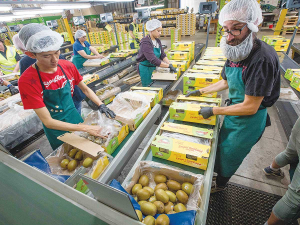State of the Dairy Nation 2024/25: DairyNZ Highlights Record Milk Production and Export Growth
DairyNZ's chief executive Campbell Parker says the 2024/25 dairy season reinforces the importance of the dairy sector to New Zealand.
 Many commentators say agricultural exports are going to be vital to our economy due to the impacts of the Covid-19 outbreak on the tourism and the forestry sectors. Last week, the first shipment of kiwifruit left Tauranga bound for Japan. The Baltic Pearl, carrying just over one million trays of SunGold Kiwifruit, will reach Japan’s Tokyo and Kobe later this month. In 2018, kiwifruit exports earned more than $2.1 billion in sales of New Zealand fruit – around half the earnings of all the country’s horticulture exports. — Photo: Jamie Troughton Dscribe Media.
Many commentators say agricultural exports are going to be vital to our economy due to the impacts of the Covid-19 outbreak on the tourism and the forestry sectors. Last week, the first shipment of kiwifruit left Tauranga bound for Japan. The Baltic Pearl, carrying just over one million trays of SunGold Kiwifruit, will reach Japan’s Tokyo and Kobe later this month. In 2018, kiwifruit exports earned more than $2.1 billion in sales of New Zealand fruit – around half the earnings of all the country’s horticulture exports. — Photo: Jamie Troughton Dscribe Media.
Coronavirus could make the 2008 Global Financial Crisis look like a walk in the park — but it’s not all bad news for ag, claims economist Cameron Bagrie.
There are still aspects of the New Zealand agriculture industry that look “really damn good,” Bagrie told a recent DairyNZ Farmers’ Forum.
“Personally, I’m looking at getting exposure to the dairy sector. There might be a bit of an issue over what price I’m prepared to pay, but I like the long-term prognosis.
“But it would be ignorant not acknowledge and take you through some of the stuff that I’m seeing at present, because it is disturbing.”
Bagrie was a keynote speaker at the series of Farmers’ Forum events recently held throughout the country. He admitted to having to change his presentation each day, as the fast-moving crisis progressed and countries closed their borders.
He told the Canterbury forum – held on March 12, before the Government imposed self-isolation on all overseas arrivals and banned large gatherings – which credit markets were starting to go off.
“You can bet your bottom dollar those cruise ships around the globe have got debt on them. They need those ships to be operating. Airlines have got debt. Airports have got debt.”
Transport was in “wholesale collapse.”
Bagrie said discretionary spending would go out the window, but New Zealand needed the containers of goods coming in to send the full containers back out.
“What we’ve got at the moment is an absolute supply chain mess. And even if Coronavirus goes away in the next two weeks – which, let’s be honest, it’s not going to – it’s going to take six months to get the shipping lines, the distribution capability, back into place.”
The message for any business was around liquidity and cash flow.
“Make sure you’ve got a bit of a buffer, go have those honest conversations with the banks.”
Bagrie said that when things get tough, the quality players rise to the top of the pile.
“We tend to see a bit of a shake-up. And quite often those shake-ups can be pretty healthy, if they force a little bit of change within an industry.”
While businesses could not control what’s going on globally they can manage the small things.
“Microeconomics is those small things, the little things in front of your eyes that you can control. They determine success or otherwise.”
Businesses expecting the pace of change to slow are “smoking pot,” said Bagrie.
Plant-based and alternative proteins are now economic reality and the only way to respond to being disrupted is to innovate at a faster pace than the disruptors can get distribution capability.
“You need to learn to take more risk. Why? Because not taking risk is no longer the risk-free strategy.”
Taking risk had to be evidence-based, he said.
“But sitting there, standing still, putting your head in the sand, no matter whether you look at disruption or what’s going on around the globe in regard to Coronavirus, is not a strategy.”
The 5+ A Day Charitable Trust has launched a collection of affordable recipes designed to turn everyday vegetables into seasonal stars.
Jane Mellsopp has been confirmed as the new Government Appointee to the New Zealand Meat Board (NZMB).
To celebrate the tenth anniversary of its annual Good Deeds competition, Rabobank will give away $100,000 to improve rural community hubs, schools, clubrooms, and marae across New Zealand.
Agricultural and veterinary product supplier Shoof International has appointed Michaela Dumper as its new chief executive.
Federated Farmers is celebrating following the Government's announcement that young farmers will be able to use their KiwiSaver funds to buy their first home or farm.
The Meat Industry Association of New Zealand (MIA) today announced that Chief Executive Officer Sirma Karapeeva has resigned from the role.

OPINION: A mate of yours truly reckons rural Manawatu families are the latest to suffer under what he calls the…
OPINION: If old Winston Peters thinks building trade relations with new nations, such as India, isn't a necessary investment in…